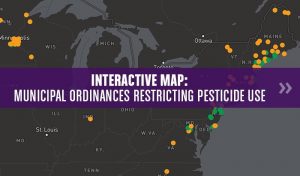05
Sep
House GOP Seeks to Scuttle Playground Bans on Glyphosate
 (Beyond Pesticides, September 5, 2018) Local Limits on Spraying Monsanto’s Toxic Weed Killer in Parks, Playgrounds, and Schoolyards. More than 50 city and county ordinances banning the use of the toxic weed killer glyphosate on local playgrounds, parks and schoolyards could be overturned by a provision championed by House Republicans in their version of the farm bill, a Beyond Pesticides and EWG analysis found.
(Beyond Pesticides, September 5, 2018) Local Limits on Spraying Monsanto’s Toxic Weed Killer in Parks, Playgrounds, and Schoolyards. More than 50 city and county ordinances banning the use of the toxic weed killer glyphosate on local playgrounds, parks and schoolyards could be overturned by a provision championed by House Republicans in their version of the farm bill, a Beyond Pesticides and EWG analysis found.
A four-page provision tucked away in the 748-page farm bill passed by the U.S. House of Representatives in June would likely preempt local governments from adopting their own pesticide regulations, including ordinances that prohibit the use of glyphosate, the active ingredient in Monsanto’s Roundup, in parks and playgrounds.
Beyond Pesticides found that 58 local ordinances ban the use of glyphosate. Overall, 155 local ordinances that regulate the use of toxic chemicals in parks and playgrounds could be preempted by Sec. 9101 of the House’s farm bill.
Glyphosate is classified by the state of California as a chemical known to cause cancer, and as a probable carcinogen by the World Health Organization. Earlier this month, a San Francisco jury ordered Monsanto to pay $289 million to a school groundskeeper who said years of working with Roundup caused his terminal cancer.
The analysis comes just weeks after tests commissioned by EWG found potentially unsafe levels of glyphosate residues in popular oat-based foods marketed toward children, including Cheerios.
Cities and counties that may no longer be able to ban glyphosate in places where children play include big cities like San Francisco and smaller communities like Evanston, Ill., among many other locations.
“Children are especially susceptible to the health impacts of toxic pesticides, so our communities should be able to decide whether our kids are rolling around in weed killers linked to cancer while playing at the park,” said Scott Faber, EWG’s senior vice president of government affairs. “Section 9101 of the House farm bill would block our communities from keeping our kids safe.”
“As independent science continues to shine light on the dangers pesticides pose to human health and the environment, local communities are responding by successfully eliminating these toxic products from regular use,” said Drew Toher, Community Resource and Policy Director at Beyond Pesticides. “Congress must continue to uphold the right of these localities to restrict pesticides linked to cancer, water contamination and pollinator decline.”
The section of the farm bill that could block cities and counties from adopting their own pesticide safety standards is opposed by the National League of Cities and the National Association of County Officials. Last week, 107 members of the House sent a letter to the farm bill conferees outlining their opposition to pesticide riders like Section 9101 and the “Poison Our Waters Provision,” which would eliminate Clean Water Act safeguards to protect communities from pesticides sprayed directly into water supplies.
Among the companies and industry groups registered to lobby Congress on pesticide provisions of the farm bill is Bayer, which now owns Monsanto, Dow and CropLife America.
“Parents and city leaders, not pesticide corporations, should decide whether their kids are playing in pesticides,” Mr. Faber said.
“To protect the health of their residents and local environment, communities have successfully implemented policies that should not be prohibited by laws written in Washington, DC,” said Jay Feldman, executive director of Beyond Pesticides. “But, that’s what proposed language in the farm bill will do, by preempting local rights to restrict pesticides,” he continued.
To see all communities with existing pesticide restrictions that could be preempted by the House farm bill, click here.
TAKE ACTION:
If a Democratic Senator(s) represents you in the U.S. Senate, click here to let the Senator know that you want this provision preempting the rights of local governments kept out of the Farm Bill.
If your Democratic U.S. Representative is not on the letter from 105 members to the Farm Bill conference committee (click here to see letter), please reach out and tell them that you want them to sign-on the letter or write their own letter opposing preemption. Click here to find your Representative and then click on the envelope under his/her picture to send the following message: Please sign on to Rep. Donald McEachin’s letter to the Farm Bill conference committee, urging that Sec. 9101 in the GOP Farm Bill be rejected and the right of local governments to protect children’s and environmental health be preserved.
Contacts:
Jay Feldman, executive director, Beyond Pesticides,202-255-4296, [email protected]
Drew Toher, community resource and policy director, Beyond Pesticides, 202-543-5450, [email protected]
Alex Formuzis, Sr VP Communications and Strategic Campaigns, Environmental Working Group (EWG), 202-667-6982, [email protected]










